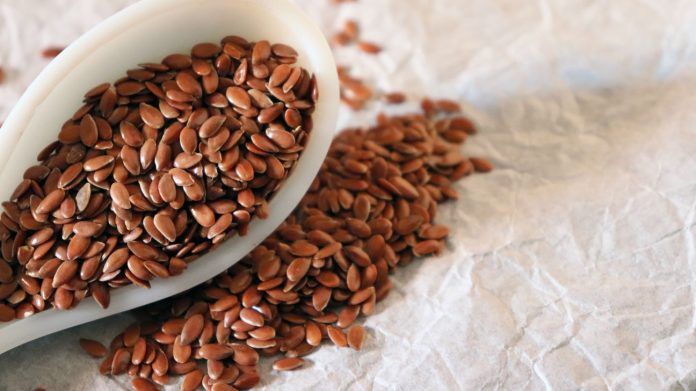Seeds, those tiny wonders often overshadowed by larger foods, carry a wealth of essential nutrients that not only contribute to overall well-being but also play a vital role in reducing the risk of various health issues. Health experts hail seeds as nutritional powerhouses, brimming with dietary fiber, healthy fats, vitamins, minerals, and antioxidants.
Flaxseeds (Linseeds):
Flaxseeds, also known as linseeds, stand out as a remarkable source of dietary fiber and omega-3 fatty acids, particularly alpha-linolenic acid (ALA). ALA, a critical omega-3, boasts an impressive list of health benefits. It’s worth noting that flaxseeds house their omega-3 treasures within a sturdy outer shell, which our bodies cannot digest effectively. To fully harness the omega-3 goodness, it’s recommended to grind flaxseeds into a fine powder and consume them by mixing with water or other foods.
In a mere one-ounce (28-gram) serving of flaxseeds, you’ll encounter 152 calories, a generous 7.8 grams of dietary fiber, 5.2 grams of muscle-building protein, 2.1 grams of heart-healthy monounsaturated fat, 6.5 grams of omega-3 fatty acids, 1.7 grams of omega-6, and significant doses of essential nutrients like manganese and thiamine (vitamin B1). Flaxseeds are also a treasure trove of polyphenolic compounds, particularly lignans, which double as potent antioxidants.
Flaxseeds have been linked to a reduction in cholesterol levels, a lowering of blood pressure, and a decreased risk of cardiovascular diseases. These remarkable seeds may also hold the key to breast cancer risk reduction in women and a lowered susceptibility to other forms of cancer. Additionally, flaxseeds show promise in managing diabetes and cutting down the risk of developing type 2 diabetes.
Chia Seeds:
Chia seeds are another seed-based nutritional powerhouse, boasting high dietary fiber content, omega-3 fatty acids, and a plethora of essential nutrients. In each one-ounce (28-gram) serving of chia seeds, you’ll find 137 calories, an impressive 10.6 grams of fiber, 4.4 grams of protein to support muscle health, 0.6 grams of monounsaturated fat, 4.9 grams of omega-3, 1.6 grams of omega-6, and notable doses of thiamine (vitamin B1), magnesium, and manganese.
Chia seeds are fantastic for elevating ALA intake, a crucial omega-3 fatty acid renowned for its inflammation-fighting prowess. Additionally, chia seeds may assist in managing blood sugar levels and lowering the risk of heart disease.
Studies have demonstrated that regular chia seed consumption can lead to reduced blood pressure and decreased inflammation markers in the body, especially when consumed daily over a period of 12 weeks. These versatile seeds may also contribute to weight loss by curbing appetite.
Pumpkin Seeds:
Pumpkin seeds, often referred to as pepitas, offer a healthy dose of phosphorus, monounsaturated fats, and omega-6 fatty acids. Within a single one-ounce (28-gram) serving of pumpkin seeds, you’ll uncover 151 calories, 1.7 grams of dietary fiber, 7 grams of protein to nourish your muscles, 4 grams of monounsaturated fat, 6 grams of omega-6, and substantial quantities of manganese, magnesium, and phosphorus.
Pumpkin seeds also excel as a source of phytosterols, natural compounds renowned for their cholesterol-lowering properties. They hold the potential to reduce the risk of heart disease and provide protection against specific types of cancer. Additionally, pumpkin seeds might play a role in diminishing the risk of urinary stones and supporting optimal bladder function.
Sunflower Seeds:
Sunflower seeds, commonly embraced in Asia and frequently used in the Middle East in paste form, strike a balanced nutritional chord. They supply your body with protein, monounsaturated fats, and a significant dose of vitamin E. In just one ounce (28 grams) of sunflower seeds, you’ll encounter 164 calories, 2.4 grams of dietary fiber, 5.8 grams of protein, 5.2 grams of monounsaturated fat, 6.4 grams of omega-6 fatty acids, ample vitamin E, and substantial amounts of manganese and magnesium.
Consistent sunflower seed consumption has shown promise in reducing inflammation, particularly among middle-aged and elderly individuals. Furthermore, these seeds could potentially lower the risk of heart disease.
In summary, seeds offer a bounty of health benefits, boasting dietary fiber, plant-based proteins, and the antioxidant prowess of polyphenols. Furthermore, some seeds, enriched with lignans, may be pivotal in reducing cholesterol levels and mitigating cancer risks. Incorporating seeds into your daily diet, whether by sprinkling them over salads, mixing them into yogurt, adding them to porridge, or blending them into smoothies, provides a delectable and straightforward means of reaping their extensive health rewards.


